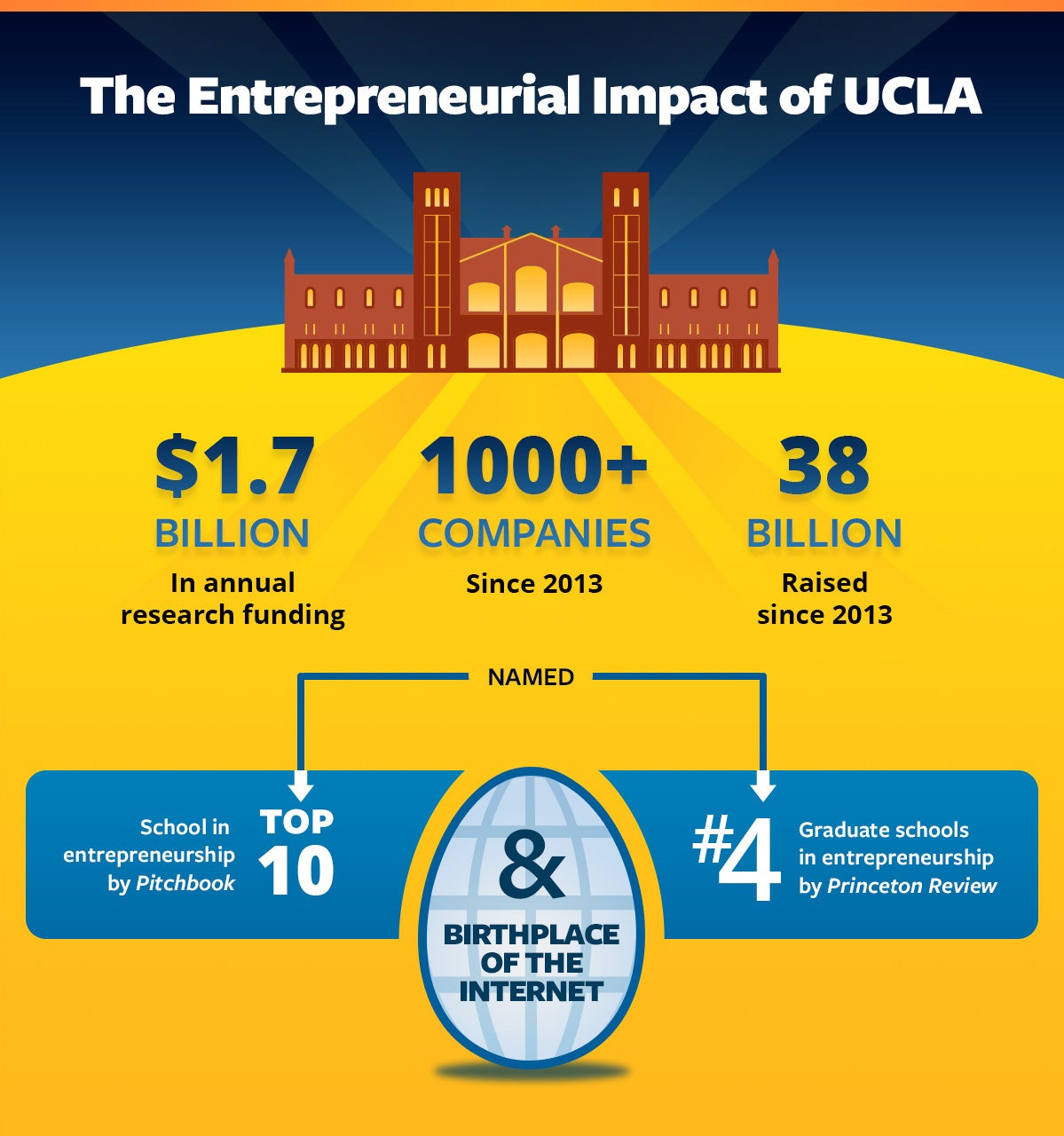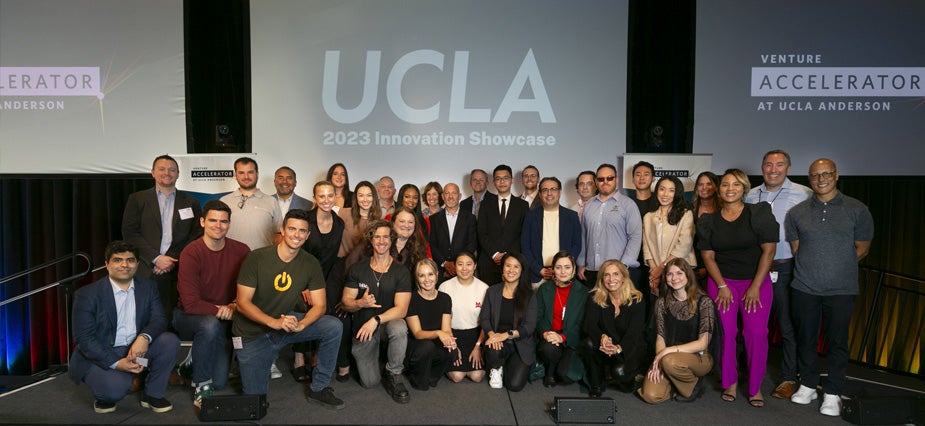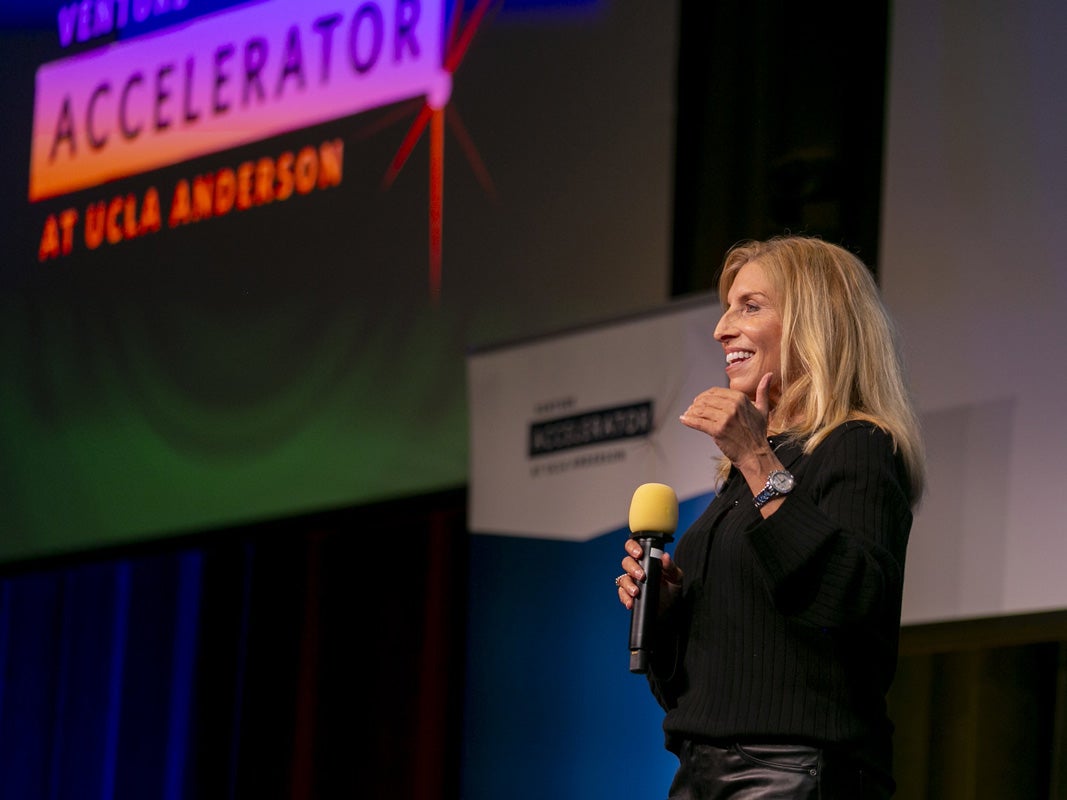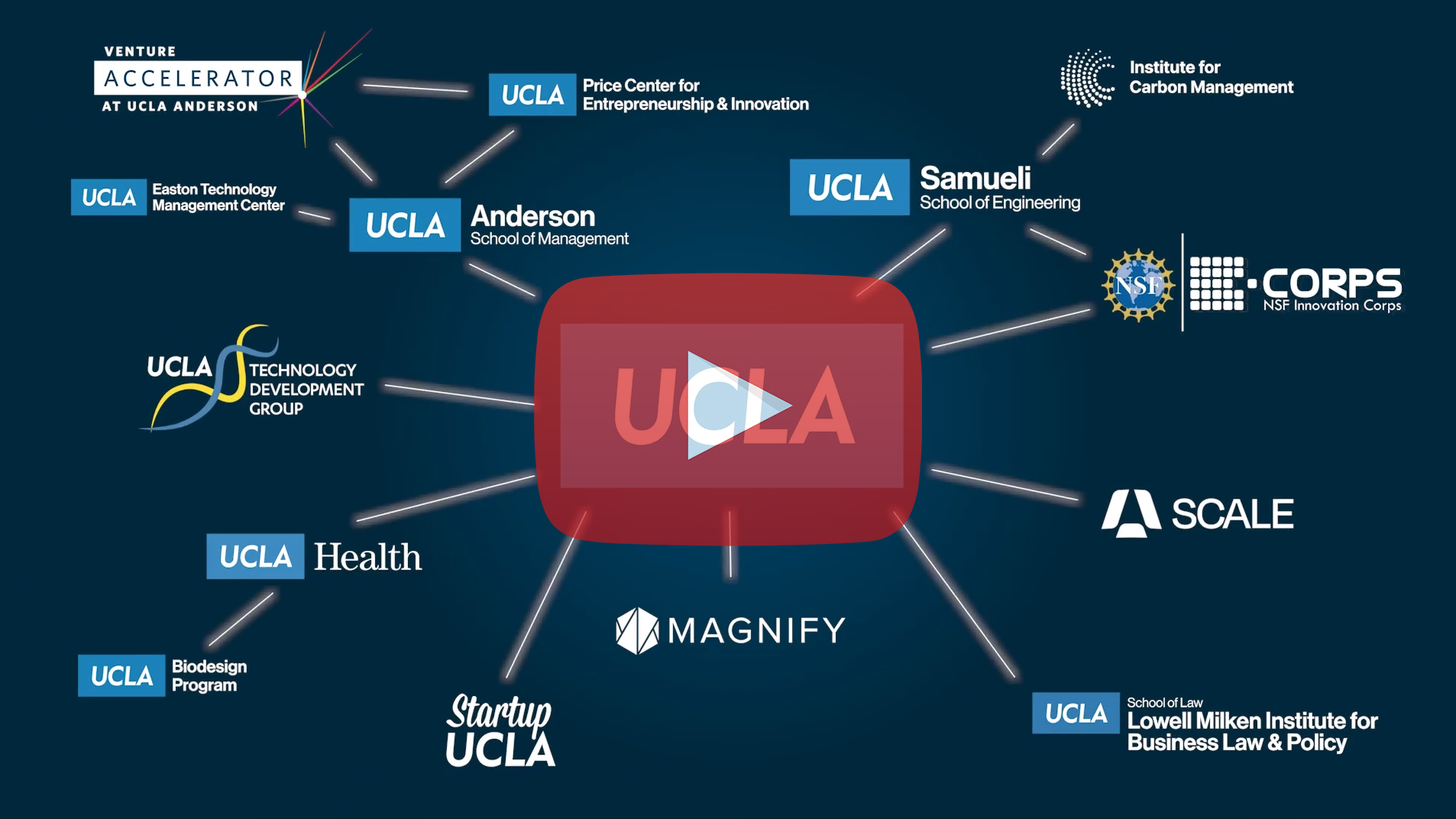Venture Accelerator at Anderson’s Inaugural Innovation Showcase
A First-Ever Showcase of Entrepreneurs from Across UCLA
Founders spanning our entrepreneurial ecosystem pitched VCs
November 17, 2023

- The Venture Accelerator at UCLA Anderson presented the inaugural UCLA Innovation Showcase at Google’s Venice Beach headquarters
- The showcase enabled startup founders across UCLA’s entrepreneurial ecosystem to pitch venture capitalists and compete for substantial funding
- Anderson is boosting campuswide entrepreneurship by offering an expansive range of resources to diverse founders in every discipline and department
The packed house at Google headquarters in Venice Beach was burbling with tension and anticipation last week as 14 company founders from a cross-section of UCLA’s entrepreneurial ecosystem prepared to compete in the inaugural Innovation Showcase, presented by the Venture Accelerator at UCLA Anderson School of Management.
At stake in this once-in-a-lifetime opportunity: $100,000 in prize money, awarded from venture capital funds managed by three members of the Draper family (siblings and UCLA alumni Jesse, founding partner of Halogen Ventures; Adam, co-founder and managing director of Boost VC; and Billy, founder and managing partner of Path Ventures); a Google for Startups Cloud Program credit package worth up to $350,000 in cloud credits; and a $2,500 “sweetener” from the Venture Accelerator.

One by one, in a rapid succession of presentations that would impress even the most skeptical judge on “Shark Tank,” the founders took to the stage to pitch their inventions to a live audience of venture capitalists, investors and UCLA faculty and students, as well as those watching the livestream of the event.
Andreas Neuman (EMBA ’14) introduced UAV-IQ, an agtech company that utilizes drones to control pests on commercial farms and vineyards.
Karin Lin (EMBA ’24) touted the benefits of Unisoy, a high-protein jerky snack made with verified non-GMO ingredients.
Veronica Pellegrino, a registered nurse at UCLA Health, presented a medical tool she created and called Popsy that streamlines the opening of blister packs for nurses and health care professionals.
The range of these early-stage businesses — from B2B tech to space to consumer products — highlighted UCLA’s robust and diverse entrepreneurial mindset. Over the past decade, Anderson’s Price Center for Entrepreneurship & Innovation has helped to create 400 startups, with $1.8 billion in funding and 4,000 jobs, elevating Los Angeles to No. 3 among startup hubs in the U.S., behind only San Francisco and New York.
According to Venture Accelerator director and Innovation Showcase organizer Trish Halamandaris (’92), the event at Google highlights UCLA Anderson’s efforts to boost entrepreneurship across the entire campus by offering an expansive range of resources to would-be entrepreneurs from every discipline and department, including: law school students; engineering students; biodesign, space and health care students; and even undergraduates.
“At Anderson, our goal is to support cross-campus founders in all of the professional schools to nurture their innovations and commercialize the intellectual property,” Halamandaris says.
For the Innovation Showcase at Google, Halamandaris and her team culled the initial crop of 100 founders to 10. These finalists then attended “pitch presentation boot camp” for two months to learn how to build a pitch deck and address an audience. “Narrative and communication are everything,” Halamandaris says. “If they can’t communicate their vision clearly, then they’re not going to get funding as desired and, perhaps more important, they’re not going to be able to hire and build a team.”
Halamandaris credits Jesse Draper (B.A. ’06) with the genesis of the Innovation Showcase. “Jesse sat on one of our panels for LA Tech Week in 2022 and came to me afterward and said, ‘Look, I’m an alumna and want to get involved, but it’s hard to figure out where to break in. If you guys can create one big pitch competition, it would be great for the UCLA community, and it would be great for the entire venture community in Southern California.’”

Draper, who took business classes at Anderson while majoring in theater as a Bruin undergraduate, today runs the Halogen VC fund, which invests in early-stage, female-founded consumer tech. “I think being an entrepreneur is like living the American dream,” she says. “If you work really hard and you want to solve a problem, it doesn’t matter what your background is. My brothers and I want to help build the UCLA entrepreneurial ecosystem and bring together all the different organizations and programs geared toward entrepreneurs at UCLA and at Anderson.”
“If founders can’t communicate their vision clearly, then they’re not going to get funding and, more important, they’re not going to be able to hire and build a team.”
— Trish Halamandaris (’92), Director, Venture Accelerator at Anderson
UCLA’s entrepreneurship ecosystem was especially attractive to double Bruin Nikao Yang (B.A. ’97, ’06). A co-captain of the top-ranked speech and debate team as an undergraduate, Yang earned a B.A. in economics. After graduation, he worked in investment banking during the dot-com boom and then in the nonprofit sector before returning to Westwood to enroll at Anderson.
“Although I was strong in math, my true passion was meeting with people and talking to people,” he says. “That was part of the speech and debate experience: You’re earning trust with the audience and communicating your point of view, whether you’re in the affirmative or in the negative.”
At Anderson, a new product development class Yang took with marketing professor Ely Dahan “really opened my eyes to what it means to ideate a business or product, bring it to market and price it, and then try and scale and grow it,” said he says. “It lit a fire in me.”
Yang praised Anderson’s amenities and resources, including pitch competitions and mentoring programs. A finalist in the Price Center’s annual Knapp Venture Competition, Yang recalled a global marketing class with Professor Shir Zhang that “helped me understand how to launch products in global markets. It’s a very entrepreneurial endeavor to understand a new market and a new culture.”
After a stint at Scion, a startup division within Toyota, Yang teamed with Jonathan Zweig (B.S., ’00), one of his best friends at UCLA, to start a mobile gaming company. They quickly pivoted to a mobile video advertising platform, which dovetailed nicely with the launch of Apple’s App Store in 2008. That turned into a company called AdColony.
The early days launching the startup were hectic. “After we raised our initial tranche funding through friends and family, the focus was on hiring great engineering talent,” Yang says. “Jon and I did everything to get the company off the ground. We wore all these different hats. We were building furniture. We were buying snacks at Costco. We were shopping for the best health insurance for our employees.”
Building the world’s first high-definition, instant-playing video advertising platform was a “huge untapped opportunity,” Yang says, and their vision and hard work soon paid off. In 2014, they sold AdColony to Norway-based Opera Software for $350 million.
Yang stayed with Opera for several years. Today, he works for Amazon Web Services (AWS) as principal of venture capital and startups, dedicated to the acquisition, retention and growth of startups that are building for the cloud. He serves on a select team of former founders, entrepreneurs and investors who act as go-betweens for AWS and top VC firms in North America.
His advice to the next generation of would-be entrepreneurs, and especially those in generative AI and machine learning startups?
“You have to be passionate about the problem you’re trying to solve,” he says. “You have to have a fervent belief that it’s going to be successful. And you have to have a willingness to adapt and change your point of view based on what you’re seeing in the market.”
Meanwhile, back at Google headquarters, the votes were tallied and the results announced. The Draper siblings granted $50,000 to BridgeDoc, a B2B project management software tool for public works construction, helmed by Kelly Wheeler (’23). An additional $30,000 went to Active Membranes founder Arian Edalat (CERT ’16) for his work to create advanced membranes for water treatment and desalination at any scale.
The sum of $20,000 was awarded to SparkGene Biotechnology founder Andy Chen, a UCLA Samueli School of Engineering Ph.D. who hopes to increase the efficiency of gene editing with microfluidic technology and thus democratize cell therapies.
“The companies we’re seeing today in the early stages will be the companies in the next 10 to 20 years that create what the business world looks like.”
— Jesse Draper (B.A. ’06), Founding Partner, Halogen Ventures
“This is the first-ever investment that we have gotten, so it’s very important to us,” Chen says. “Now we can focus on turning our research prototype into a commercial product. We are looking for incubator space to ramp up the commercialization process and we plan to start selling our product by January of 2025.”
Chen’s team consists of fellow postdocs, UCLA law school students and MBA students from Anderson. “I just want to keep moving forward and see if we get the chance to realize the commercialization of our technology because it’s really a game-changer. We want to make good for all human beings.”
The Google Audience Award went to Negin Majedi, founder of Symphony Biosciences, who arrived in Westwood from Iran to pursue her Ph.D. at the School of Engineering. She discovered her calling soon after cancer took the life of a beloved uncle.
“I wanted to solve the toughest problems in the field,” she says. “I started to learn about immune cells and how our bodies work, and spent the rest of the year figuring out how we can make immune cells fight better against solid cancers.”

Venture Accelerator director Trish Halamandaris (’92)
Majedi’s research in the lab led her to invent a tiny biodegradable device that, when implanted into the body, releases a drug that trains the immune system to fight solid tumors. In testing in mice, Majedi achieved remarkable results. Breast cancer tumors shrank in 80% of treated mice, while melanoma tumors shrank in 100% of them. In both cases, the therapy drastically extended the lifespan of the mice.
As graduation approached in 2020, Majedi confronted a dilemma: She could write up her results and start a postdoc, or she could try to market this potentially life-saving treatment. To Majedi, the latter option seemed almost as daunting as, well, trying to cure cancer. “It’s tough starting from a scientific background and learning all about business,” she says, “trying to raise funds and talk to investors and all of that. But, really, that was the only choice.”
Majedi soon found that she was not alone: She discovered that she could lean on the Venture Accelerator to assist her with the transition from scientific project to startup business. She and colleagues at UCLA’s California NanoSystems Institute formed a company with assistance from the institute’s Magnify incubator. Then, as she prepared to pitch the VCs at Google, she participated in “entrepreneurial boot camp” at Anderson (a series of weekly workshops) to hone her deck and her oral presentation.
“It’s a very entrepreneurial endeavor to understand a new market and a new culture.”
— Nikao Yang (B.A. ’97, ’06), Principal of VC and Startups, Amazon Web Services
“The only reason we were able to even dream about launching a company for something that was developed in the lab is because of UCLA and the Accelerator,” she said. “When you’re not a business person, you have no connections at all. They introduced us to people with business expertise — investors and those types of people — and helped us translate something from the lab to the market.”
Together, Draper and Halamandaris envision a bright future for the Innovation Showcase. “This kind of vertically agnostic, cross-campus effort makes a lot of sense,” Halamandaris says, “because this supports the entire campus and beyond. In terms of job creation and financial clout, UCLA has an important and strategic place in the broader Los Angeles community.”
Draper views the inclusive pitch competition as “really important because it gives startups an opportunity to present to a bunch of investors, and then they get plugged into an ecosystem of funding and a network that helps them scale. The companies we’re seeing today in the early stages will be the companies in the next 10 to 20 years that create what the business world looks like.
“We would love to build this event so that students in every major will look forward to applying every year,” she says. “We hope that one day we’re doing this inside Pauley Pavilion. The sky’s the limit.”
